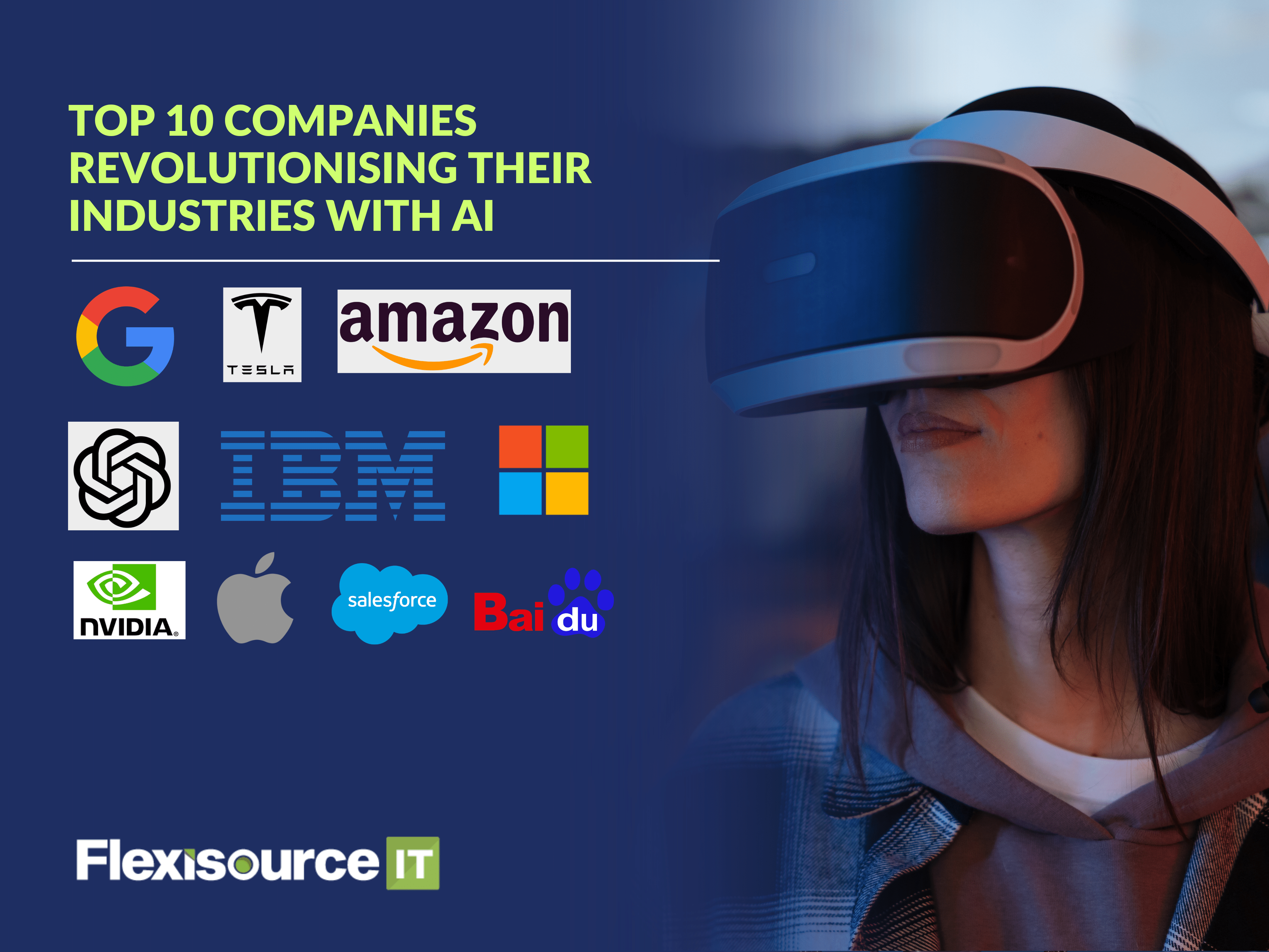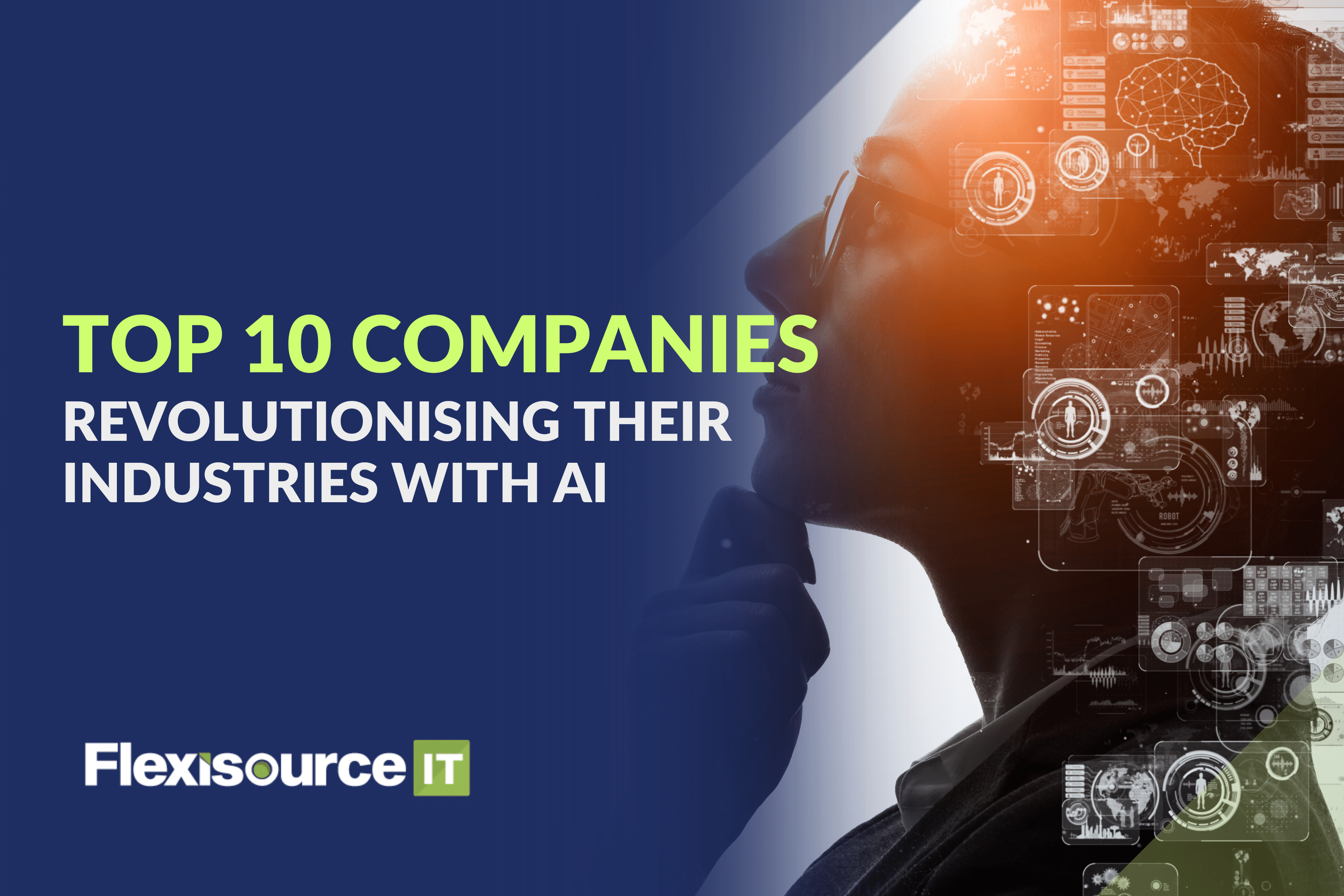Artificial Intelligence (AI) has transformed how companies operate, allowing them to make data-driven decisions, automate processes, and enhance customer experiences. Some companies are leading the charge, pioneering AI technologies that are changing their respective industries.
This article highlights ten companies revolutionising their industries through AI, showcasing their innovative applications and the impact on their respective fields.
Top 10 Companies Revolutionising Their Industries with AI

Here are some of the top 10 companies using artificial intelligence, setting new standards, and redefining what’s possible across sectors.
Company 1: Google
Since its foundation in 1988, Google has gained prominence as a search engine, but it has since expanded into a vast array of services and products that leverage advanced technologies. From self-driving cars and healthcare research to natural language processing, Google became one of the companies using AI and continuously pioneers technology to transform industries and improve everyday experiences.
Similarly, Google has integrated AI across its services, enhancing user experiences and operational efficiency. For instance, Google Search utilises AI algorithms to understand user queries better and provide more relevant results. Google Assistant employs natural language processing to offer personalised assistance. In healthcare, Google’s DeepMind has developed AI models capable of predicting patient deterioration, potentially improving patient outcomes
Company 2: Tesla
Tesla, Inc. was founded in 2003 by Martin Eberhard and Marc Tarpenning. They specialises in electric vehicles (EVs), energy storage, and solar energy solutions. Under the leadership of CEO Elon Musk, Tesla has become a pivotal force in the automotive and clean energy sectors, driving significant innovation and accelerating the global transition to sustainable energy.
Tesla’s AI expertise lies in autonomous driving technology. Using AI algorithms and real-time data collected from millions of vehicles, Tesla’s Full Self-Driving (FSD) system aims to make roads safer by reducing human error. With AI-powered updates regularly deployed to its vehicles, Tesla has effectively created a “networked fleet,” where improvements made from one car’s experiences benefit all others.
By 2025, the autonomous vehicle market is expected to reach over $200 billion, with Tesla at the forefront of companies using AI to build cars.
Company 3: Amazon
Since 1994, Amazon has evolved from an online bookstore into a global technology conglomerate, offering a vast array of products and services, including e-commerce, cloud computing, and digital streaming.
Likewise, in recent years, Amazon has become one of the companies using AI. They use AI in multiple areas: its recommendation engine increases sales by analysing customer behavior, while Amazon Web Services (AWS) provides AI tools to businesses across industries. Amazon’s fulfillment centers are powered by AI to streamline logistics, manage inventory, and optimise delivery routes. Alexa, Amazon’s virtual assistant, is also a prime example of AI in everyday life, processing millions of voice requests daily.
Company 4: IBM
International Business Machines Corporation (IBM) was established in 1911 and headquartered in Armonk, New York. Since then, it has become a global leader in technology and consulting services, operating in over 175 countries. IBM’s extensive portfolio includes cloud computing, artificial intelligence (AI), computer hardware, and software solutions.
IBM Watson brings AI to sectors like healthcare, finance, and customer service. In fact, IBM’s AI initiatives have contributed to its revenue, with the company reporting $73.6 billion in 2023.
In healthcare, Watson assists in diagnosis by analysing medical data to suggest treatment options. IBM’s AI applications in finance help detect fraud and manage risk, contributing to a safer financial environment. IBM has invested billions in AI research, making it a prominent player in enterprise AI.
Company 5: Microsoft
Founded in 1975, Microsoft Corporation was renowned for its software, hardware, and cloud services. It hashas been instrumental in driving innovation across various sectors. In early 2000s, Microsoft has become a pioneer as one of the companies using AI.
They integrated AI into their Azure cloud platform, providing businesses with tools for machine learning, data analytics, and natural language processing. Microsoft’s AI-powered healthcare tools in Azure are designed to assist healthcare providers in delivering data-driven care.
They also partnered with OpenAI and have incorporated AI capabilities in products like Word and Excel, enhancing productivity with automated features.
Company 6: OpenAI
OpenAI is an AI research organisation and company focused on advancing artificial intelligence to benefit humanity. Its mission is to ensure that AI is aligned with human interests, driving innovation while keeping ethical considerations at the forefront.
OpenAI has spearheaded advancements in natural language processing with models like GPT-4, enabling applications from chatbots to content generation. GPT-4 powers various industries by improving communication and customer service and even assists in software development. OpenAI’s technology has been adopted widely, with millions of API requests daily for conversational and content-driven applications.
Company 7: NVIDIA
NVIDIA, founded in 1993, is a leading technology company specialising in graphics processing units (GPUs), system-on-a-chip units (SoCs), hardware and software. Initially focusing on the gaming industry, NVIDIA’s innovations have significantly impacted various sectors, including artificial intelligence (AI), data science, and automotive technology.
NVIDIA’s GPUs are integral to AI research and deep learning, providing the computational power necessary for complex models. Their CUDA platform allows developers to harness GPU capabilities for parallel processing, accelerating AI advancements.
Likewise, NVIDIA also offers software solutions like the NVIDIA AI Enterprise, helping industries deploy AI models efficiently. In healthcare, NVIDIA’s AI hardware accelerates genomic analysis, while its technologies in autonomous vehicles make NVIDIA a vital player in automotive AI.
Company 8: Apple
Apple Inc. is a leading multinational technology company renowned for its innovative consumer electronics, software, and services. Over the decades, Apple has significantly influenced various industries through its groundbreaking products and technologies. The company has invested heavily in research and development, focusing on areas like artificial intelligence, augmented reality, and health technologies. In 2021, Apple announced a $430 billion investment over five years to expand its U.S. operations and foster innovation across various sectors.
Apple has woven AI into its ecosystem, enhancing products like Siri, Face ID, and the Apple Watch. Face ID, Apple’s AI-driven security feature, allows secure access through facial recognition. Apple’s health-monitoring tools leverage AI to monitor heart rate and blood oxygen levels, contributing to health insights and early detection of medical issues.
Company 9: Salesforce
Salesforce, Inc. is a leading American cloud-based software company headquartered in San Francisco, California. Specialising in customer relationship management (CRM) software, Salesforce offers a suite of applications focused on sales, customer service, marketing automation, e-commerce, analytics, and application development.
In 2016, Salesforce has become one of the top companies using AI. They introduced Einstein, an AI platform that brings predictive analytics to CRM. It’s AI-driven insights help companies optimise sales, tailor marketing campaigns, and improve customer service. Salesforce uses AI to analyse data for patterns, forecast sales, and identify trends.
Likewise in 2023, Salesforce introduced Einstein GPT, a generative AI platform designed to enhance CRM functionalities. It assists with complex tasks such as product returns and refunds, automating customer service processes and aiding sales and marketing efforts.
Company 10: Baidu
Established in 2000, Baidu, Inc. is a leading Chinese multinational technology company. Initially, they are recognised for its dominance in China’s search engine market. Since then, Baidu has significantly diversified its offerings over the years. The company provides a wide array of internet services, including the Baidu App for search and newsfeed, Baidu Baike (an online encyclopedia), iQIYI (a video streaming service), and Baidu Tieba (a keyword-based discussion forum).
Beyond its core internet search business, Baidu has ventured into several high-growth areas, notably AI and autonomous driving. The company was an early adopter of AI, integrating it into its operations as early as 2010 to enhance content discovery on the internet. Leveraging “Baidu Brain,” its core AI technology engine, Baidu has developed new AI businesses and applications.
Impact of AI on Various Industries
AI is transforming industries by offering significant benefits, but it also presents certain challenges. In healthcare, AI enables faster and more accurate diagnostics, allowing doctors to detect diseases like cancer at earlier stages. For example, AI-powered imaging can analyse scans more quickly and with greater precision, improving patient outcomes and reducing costs.
Likewise, in retails, benefits from AI-driven includes inventory management, reducing waste and improving customer satisfaction. Manufacturing employs AI for predictive maintenance, which can reduce downtime by up to 30%. In finance, AI strengthens fraud detection and helps automate trading and customer support, saving billions annually in operational costs.
However, AI adoption also raises concerns about job displacement. In sectors like manufacturing and retail, AI-driven automation can replace routine tasks previously performed by human workers. While this increases efficiency, it may lead to reduced job opportunities for certain roles, sparking debates on workforce retraining and the social impact of AI on employment.
Conclusion
These top companies leading the way in AI demonstrate just how transformative this technology can be across diverse industries. It is reshaping what’s possible in the modern world.
As these companies push the boundaries of innovation, they set new standards that inspire others to consider how AI could benefit their own operations. Embracing AI not only drives efficiency and growth but also prepares businesses to thrive in an increasingly tech-driven future.
Are you thinking about integrating AI into your business? Flexisource IT can help you explore and implement AI solutions to drive innovation and efficiency. Contact our team today to discover how AI can elevate your business.





